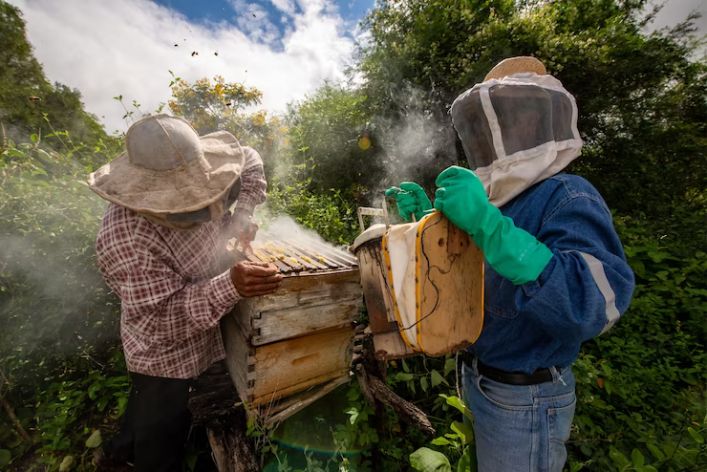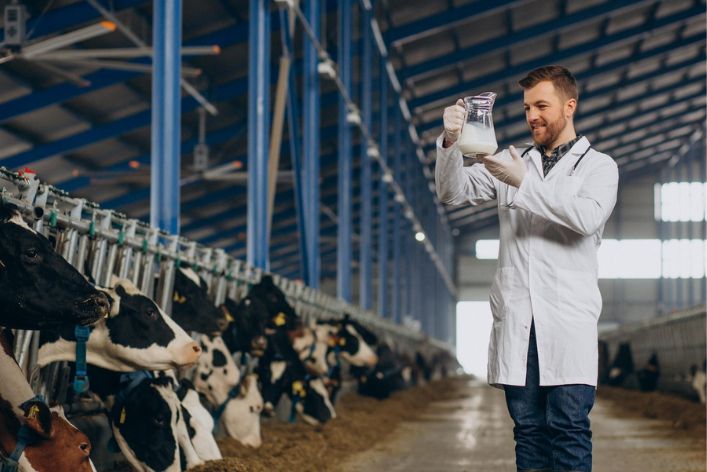Introduction
Nigeria’s fishing industry is an important sector of the country’s economy, contributing significantly to food security and employment opportunities.
With a coastline of over 800km, Nigeria’s marine wealth is vast and largely untapped, presenting vast potential for the fishing industry. The fishing industry provides fishing jobs in Nigeria and employment opportunities in related fields such as transportation, processing, and marketing, making it a vital sector of the economy.
The fishing industry is essential to Nigeria’s food security, providing a source of protein for over 180 million people. In addition, the sector is an important source of foreign exchange earnings for the country.
The bulk of Nigeria’s fish products are sold domestically, but the country also exports fish to neighboring countries and beyond. The fishing industry plays a significant role in poverty reduction by providing jobs and livelihoods for many Nigerians.
The fishing industry in Nigeria offers a range of job opportunities, from fishing crews to processing workers, exporters, marketers, and support staff.
Fishing jobs in Nigeria are available for skilled and unskilled workers, with opportunities ranging from working as a fisherman to managing a fishing enterprise. Many jobs are seasonal, but there is a constant demand for skilled workers in the industry.
In essence, the fishing industry in Nigeria is a significant contributor to the country’s economy, providing food security and employment opportunities for many Nigerians.
Nigeria’s marine wealth presents vast potential for the industry, and tapping into this potential will lead to increased economic growth and development. With various job opportunities, the fishing industry in Nigeria presents a promising career path for those interested in the sector.
Read: Agricultural Engineering in Nigeria: Career Prospects
Exploring the Different Types of Fishing Industry Jobs in Nigeria
With a coastline of over 853 kilometres and an exclusive economic zone (EEZ) spanning 200 nautical miles, Nigeria has enormous marine wealth that can be exploited to create jobs and boost economic growth.
In fact, the fishing industry is one sector that has great potential to provide sustainable livelihoods for millions of Nigerians, especially those living in coastal communities.
Types of Fishing Industry Jobs
There are several types of fishing industry jobs in Nigeria. These include:
Commercial Fishing Jobs
Commercial fishing is one of the most important and lucrative sectors of the fishing industry. It involves catching fish and other marine species for sale in local and international markets. Commercial fishing jobs in Nigeria include:
- Deckhands – responsible for setting and hauling the fishing nets, as well as cleaning and maintaining equipment.
- Fishing Crew members – responsible for operating fishing vessels, navigating the waters, and preparing catches for sale.
- Fishing Gear Technicians – responsible for maintaining and repairing fishing gear and equipment to ensure optimal performance.
- Fishing Managers – responsible for overseeing commercial fishing operations, planning and managing budgets, and ensuring compliance with fishing regulations.
Support Services Jobs
Support services jobs are critical to the success of the fishing industry. They provide essential services, equipment, and supplies to commercial fishermen and seafood processing facilities. Support services jobs in Nigeria include:
- Boat and Ship Repair Specialists – responsible for repairing and maintaining fishing vessels and other marine equipment.
- Ice and Ice Machine Suppliers – responsible for supplying ice to keep fish fresh during transportation and storage.
- Fuel and Oil Suppliers – responsible for supplying fuel and oil to fishing vessels and marine equipment.
- Marine Insurance brokers – responsible for providing insurance coverage for fishing vessels and crew members.
Seafood Processing Jobs
Seafood processing jobs involve preparing, packaging, and preserving fish and other marine species for sale in local and international markets. Seafood processing jobs in Nigeria include:
- Cutters – responsible for cleaning, filleting, and preparing fish and other seafood for further processing or sale.
- Packers – responsible for packing and labeling fish and other seafood products for shipment and sale.
- Quality Control Technicians – responsible for ensuring that seafood products meet quality and safety standards.
- Plant Managers – responsible for overseeing seafood processing operations, managing staff, and ensuring compliance with food safety and quality standards.
Research and Education Jobs
Research and education jobs are crucial for the sustainable management of fishery resources and for the development of new fishing technologies and techniques. Research and education jobs in Nigeria include:
- Marine Biologists – responsible for researching fish populations, habitats, and behaviour, as well as developing sustainable fishery management plans.
- Environmental Scientists – responsible for assessing the impact of fishing activities on the marine environment and developing strategies for mitigating negative impacts.
- Fisheries Extension Workers – responsible for educating fishermen and coastal communities about sustainable fishing practices and promoting fishery conservation and management.
- Fishing Gear Designers – responsible for developing new and innovative fishing gear and equipment that are more efficient and environmentally-friendly.
The fishing industry has enormous potential to provide sustainable jobs and boost economic growth in Nigeria.
By exploring the different types of fishing industry jobs, it is evident that there is a wide range of opportunities available for people with different skills and interests.
However, sustainable fishing practices, environmental management, and effective regulation are crucial for the long-term success of the industry.
Read: Promising Careers in Nigeria’s Organic Farming Sector
Skills and Requirements in Nigeria’s Fishing Industry
The fishing industry in Nigeria is a vital source of income for many local communities, providing employment opportunities for people with a variety of different skills and qualifications.
Let’s explore the skills and requirements for different types of jobs in the fishing industry, including commercial fishing, support services, seafood processing, and research and education.
Qualifications for Commercial Fishing Jobs
- Ability to swim and work in demanding physical conditions
- Commercial fishing license
- Knowledge of fishing equipment and techniques
- Basic education level
- Experience working on fishing vessels
- Ability to work long hours and handle heavy equipment
The commercial fishing industry is an integral part of the Nigerian economy, and it requires workers with practical skills and physical endurance.
To work in this industry, you must have a commercial fishing license and experience working on fishing vessels.
You should also be able to swim and work in demanding physical conditions while handling heavy equipment. It is not always necessary to have a high level of education, but a basic education level is required in most cases.
Education and Training Requirements for Support Services Jobs
- Knowledge of marine safety regulations
- Basic education level
- Training or certification in specific job duties, such as deckhand or marine engineer
- Knowledge of navigation and communication equipment
- Ability to work in a team environment
Support services jobs in the fishing industry include roles such as deckhands, marine engineers, and ship officers.
These jobs require workers to have knowledge of marine safety regulations and the ability to work in a team environment while following strict instructions.
While a basic education level is required, specific job duties may require training or certification. Workers may also need to have knowledge of navigation and communication equipment.
Requirements for Seafood Processing Jobs
- Ability to work in a fast-paced environment
- Knowledge of processing equipment and techniques
- Basic education level
- Ability to follow strict hygiene and safety regulations
- Physical stamina
- Experience working in a seafood processing facility
Seafood processing jobs involve processing and packaging fish, shrimp, and other seafood products for export.
These jobs require workers to have knowledge of processing equipment and techniques and the ability to work in a fast-paced environment while following strict hygiene and safety regulations.
Workers should also have physical stamina and experience working in a seafood processing facility. While a basic education level is required, workers can gain on-the-job training and experience.
Skills Needed for Research and Education Jobs
- Ability to conduct scientific research
- Advanced education, such as a master’s or doctoral degree in marine biology or a related field
- Analytical and critical thinking skills
- Excellent written and verbal communication skills
- Knowledge of marine conservation regulations and policies
- Ability to work in a team environment
Research and education jobs in the fishing industry require workers to have advanced education in a field such as marine biology or fisheries management.
Workers must also be able to conduct scientific research and have analytical and critical thinking skills. Excellent written and verbal communication skills are also necessary for these roles, as workers must be able to communicate effectively with colleagues, stakeholders, and the general public.
Workers should have knowledge of marine conservation regulations and policies and the ability to work in a team environment.
The fishing industry in Nigeria offers a wide range of employment opportunities for workers with different skills and qualifications.
Whether you aspire to work on a fishing vessel, in support services or seafood processing, or in research and education, there are many paths to a fulfilling career in this field.
By developing the necessary skills and gaining experience, you can build a successful career and contribute to the sustainable development of Nigeria’s marine wealth.
Read: The Booming Horticulture Sector: Jobs in Nigeria

Delve into the Subject: Nigerian Universities Offering Animal Genetics Courses
Major Fishing Industry Players
As one of the largest coastal countries in Africa, Nigeria has great potential in the fishing industry. The sector provides job opportunities for many Nigerians, particularly those living in coastal communities. Below are some of the major players in Nigeria’s fishing industry:
Government agencies involved in fishing industry regulation:
- Nigerian Institute for Oceanography and Marine Research (NIOMR) – The primary government agency responsible for the development and regulation of the fishing industry in Nigeria. The agency conducts research on marine life, provides advisory services to fishermen, and promotes sustainable fishing practices.
- Nigerian Maritime Administration and Safety Agency (NIMASA) – This agency is responsible for maritime safety and security, including monitoring fishing activities in Nigeria’s territorial waters.
- National Inland Waterways Authority (NIWA) – Though primarily responsible for inland waterways, NIWA also regulates fishing activities in Nigeria’s rivers and lagoons.
Major fishing companies and their employment opportunities:
- With over 25 years of experience in the fishing industry, Pan Ocean is one of the largest players in the sector. The company employs thousands of Nigerians in various areas of fishing, including processing and transportation.
- A coalition of fishing companies with a focus on promoting sustainable fishing practices. NITOA members employ thousands of Nigerians in various fishing-related jobs.
- A leading supplier of fishing vessels and equipment in Nigeria. The company provides employment opportunities for Nigerians in the manufacturing and maintenance of fishing equipment.
Organizations involved in promoting sustainable fishing practices:
- A non-governmental organization focused on promoting the sustainable use of Nigeria’s natural resources, including marine resources. The NCF advocates for sustainable fishing practices and works with local communities to implement them.
- A regional organization that promotes sustainable marine resource management and provides training and education on sustainable fishing practices.
- An international organization with a focus on promoting food security and sustainable agriculture. The FAO provides technical assistance to Nigeria in the development of sustainable fishing practices.
Generally, Nigeria has enormous potential in the fishing industry. The government, major fishing companies, and organizations promoting sustainable fishing practices all play a significant role in the sector.
There are vast opportunities for employment in various areas of the fishing industry, particularly in coastal communities.
However, sustainable fishing practices are necessary to ensure the industry’s continued growth and the conservation of Nigeria’s marine wealth.
Challenges and Opportunities
When it comes to Nigeria’s fishing industry, there are both challenges and opportunities for job seekers. While there are environmental challenges facing the fishing industry, the government is taking steps to promote job creation and improve technology to create more opportunities.
Environmental challenges facing the fishing industry
- Pollution of waterways due to oil spills and waste disposal affects the availability of fish.
- Overfishing due to illegal and unregulated fishing practices leads to a decline in fish populations.
- Global warming and climate change lead to unpredictable weather patterns, making it difficult to plan for fishing activities.
Opportunities for job seekers in the fishing industry
- Fishing provides direct employment for fishermen, boat operators, and processors.
- There are also indirect jobs in related industries such as transportation, equipment manufacturing, and marketing.
- Fishing can provide a source of income for communities in coastal areas.
Government initiatives to promote job creation in the fishing industry
- The Nigerian government has established various development programs and projects such as the Agricultural Credit Guarantee Scheme (ACGS) to provide credit facilities to individuals and groups in the fishing industry.
- The Nigerian Incentive-Based Risk Sharing for Agricultural Lending (NIRSAL) program ensures commercial banks lend to agribusinesses and reduces the risk of non-repayment of loans.
- The government has also established vocational training centers and provided equipment to encourage youths to take up fishing as a profession.
The role of improved technology in creating more job opportunities
- New technologies such as smart fish finders, GPS systems, and improved fishing gear have increased efficiency and productivity in the fishing industry, creating more jobs.
- Processing and storage facilities have also improved, leading to increased demand for skilled workers to operate and maintain the equipment.
- Technology has led to innovations such as aquaculture and fish farming, creating additional job opportunities in the industry.
Furthermore, the fishing industry in Nigeria faces environmental challenges, but there are opportunities for job seekers, especially with the government’s efforts to promote job creation and improve technology. With the right support and investment, the fishing industry can be a source of employment for many Nigerians.
Read: Grain Farming in Nigeria: Job Opportunities Explored
Conclusion
Finally, the fishing industry plays a crucial role in the economy of Nigeria, providing employment opportunities for thousands of people and contributing significantly to the nation’s GDP.
The industry offers various job opportunities such as fishing vessel operators, fish processors, fish farmers, and fish inspectors.
Given the potential of the industry and the job opportunities available, it is essential for job seekers to explore this sector, acquire the required skills, and take advantage of the vacancies.
The fishing industry has the potential to create more jobs and significantly impact the country’s economy.
Therefore, it is crucial for the Nigerian government and other stakeholders to support the industry by providing the necessary infrastructure, technology, and education to the people involved. Job seekers should explore this sector and seize the opportunities it offers for the growth of the entire nation’s economy.




